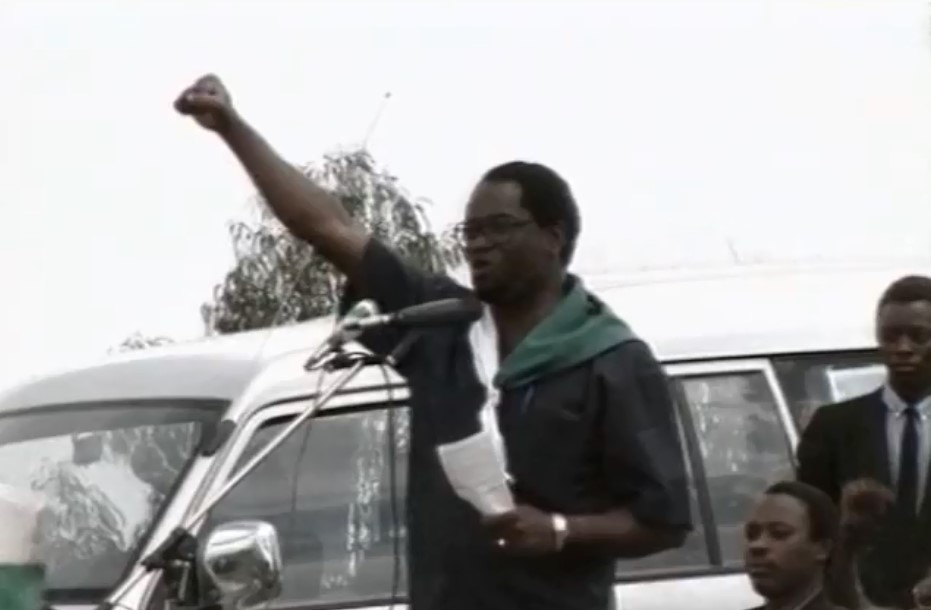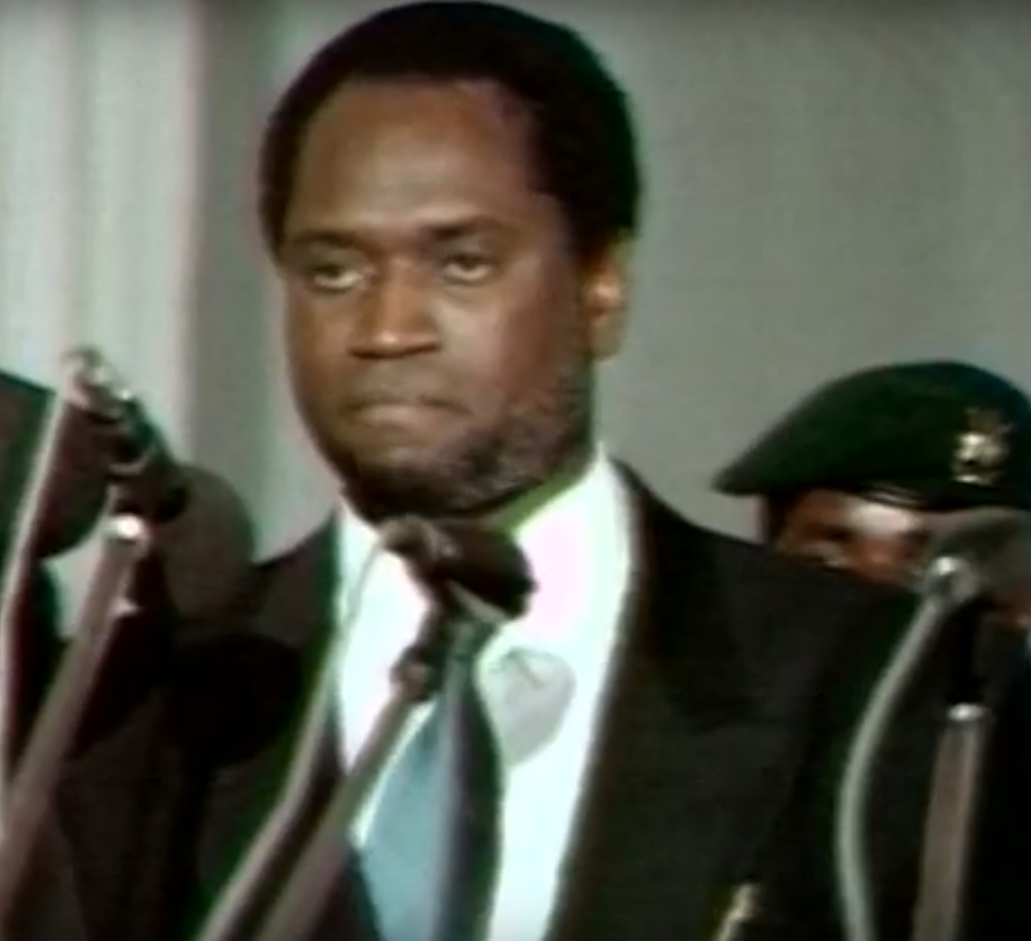|
Gilles Bimazubute
Gilles Bimazubute (1934 – 21 October 1993) was a Burundian politician. Early life Gilles Bimazubute was born in 1934 in the Ijenda region, Ruanda-Urundi. He was a member of the Abasapfu clan of the Tutsi ethnic group. He attended the Official University of the Congo and Ruanda-Urundi in Élisabethville from 1958 until his expulsion in 1961. In 1959 he and Prime Nyongabo founded the Union Culturelle de la Jeunesse Africaine du Burundi (UCJAB), a youth nationalist organisation. In 1961 UCJAB was renamed Jeunesse Nationaliste Rwagasore (JNR). The following year he was arrested for a short time. He was married to the niece of politician André Muhirwa. Career In 1962 Bimazubute was appointed director of Radio Burundi. He resigned to take up a position at Hatton & Cookson, a British trading firm with offices in Bujumbura. In 1963 he was appointed ''chef de cabinet'' in the Burundian Ministry of Foreign Affairs. From that September he served as acting Minister of Foreign Affai ... [...More Info...] [...Related Items...] OR: [Wikipedia] [Google] [Baidu] |
Demographics Of Burundi
This article is about the demographic Demography () is the statistical study of populations, especially human beings. Demographic analysis examines and measures the dimensions and dynamics of populations; it can cover whole societies or groups defined by criteria such as edu ... features of the population of Burundi, including population density, Ethnic group, ethnicity, education level, health of the populace, economic status, religious affiliations and other aspects of the population. At 206.1 persons per km², Burundi has the second-largest population density in Sub-Saharan Africa. Most people live on farms near areas of fertile volcanic soil. The population is made up of three major ethnic groups – Hutu (''Bahutu''), Tutsi (''Batutsi'' or ''Watusi''), and Great Lakes Twa, Twa (''Batwa''). Kirundi is the common language. Intermarriage takes place frequently between the Hutus and Tutsis. The terms "pasture, pastoralist" and "agriculture, agriculturist", often used ... [...More Info...] [...Related Items...] OR: [Wikipedia] [Google] [Baidu] |
Mobutu Sese Seko
Mobutu Sese Seko Kuku Ngbendu Wa Za Banga (; born Joseph-Désiré Mobutu; 14 October 1930 – 7 September 1997) was a Congolese politician and military officer who was the president of Zaire from 1965 to 1997 (known as the Democratic Republic of the Congo from 1965 to 1971). He also served as Chairman of the Organisation of African Unity from 1967 to 1968. During the Congo Crisis, Mobutu, serving as Chief of Staff of the Army and supported by Belgium and the United States, deposed the democratically elected government of left-wing nationalist Patrice Lumumba in 1960. Mobutu installed a government that arranged for Lumumba's execution in 1961, and continued to lead the country's armed forces until he took power directly in a second coup in 1965. To consolidate his power, he established the Popular Movement of the Revolution as the sole legal political party in 1967, changed the Congo's name to ''Zaire'' in 1971, and his own name to Mobutu Sese Seko in 1972. Mobutu claimed th ... [...More Info...] [...Related Items...] OR: [Wikipedia] [Google] [Baidu] |
1993 Deaths
File:1993 Events Collage.png, From left, clockwise: The Oslo I Accord is signed in an attempt to resolve the Israeli–Palestinian conflict; The White House (Moscow), Russian White House is shelled during the 1993 Russian constitutional crisis; Czechoslovakia is peacefully Dissolution of Czechoslovakia, dissolved into the Czech Republic and Slovakia; In the United States, the ATF Waco siege, besieges a compound belonging to David Koresh and the Branch Davidians in a search for illegal weapons, which ends in the building being set alight and killing most inside; Eritrea gains independence; A major 1993 Storm of the Century, snow storm passes over the United States and Canada, leading to over 300 fatalities; Drug lord and narcoterrorism, narcoterrorist Pablo Escobar is killed by Military Forces of Colombia, Colombian special forces; Ramzi Yousef and other Islamic terrorism, Islamic terrorists 1993 World Trade Center bombing, detonate a truck bomb in the subterranean garage of List of t ... [...More Info...] [...Related Items...] OR: [Wikipedia] [Google] [Baidu] |
1934 Births
Events January–February * January 1 – The International Telecommunication Union, a specialist agency of the League of Nations, is established. * January 15 – The 8.0 1934 Nepal–Bihar earthquake, Nepal–Bihar earthquake strikes Nepal and Bihar with a maximum Mercalli intensity scale, Mercalli intensity of XI (''Extreme''), killing an estimated 6,000–10,700 people. * January 26 – A 10-year German–Polish declaration of non-aggression is signed by Nazi Germany and the Second Polish Republic. * January 30 ** In Nazi Germany, the political power of federal states such as Prussia is substantially abolished, by the "Law on the Reconstruction of the Reich" (''Gesetz über den Neuaufbau des Reiches''). ** Franklin D. Roosevelt, President of the United States, signs the Gold Reserve Act: all gold held in the Federal Reserve is to be surrendered to the United States Department of the Treasury; immediately following, the President raises the statutory gold price from ... [...More Info...] [...Related Items...] OR: [Wikipedia] [Google] [Baidu] |
Order Of Succession
An order of succession or right of succession is the line of individuals necessitated to hold a high office when it becomes vacated such as head of state or an honour such as a title of nobility.UK Royal Web site "The order of succession is the sequence of members of the Royal Family in the order in which they stand in line to the throne. This sequence is regulated not only through descent, but also by Parliamentary statute." This sequence may be regulated through descent or by statute. Hereditary government form differs from |
Melchior Ndadaye
Melchior Ndadaye (28 March 1953 – 21 October 1993) was a Burundian intellectual and politician. He was the first democratically elected and first Hutu president of Burundi after winning the landmark 1993 election. Though he moved to attempt to smooth the country's bitter ethnic divide, his reforms antagonised soldiers in the Tutsi-dominated army, and he was assassinated amidst a failed military coup in October 1993, after only three months in office. His assassination sparked an array of brutal tit-for-tat massacres between the Tutsi and Hutu ethnic groups, and ultimately sparked the decade-long Burundi Civil War. Early life Melchior Ndadaye was born on 28 March 1953 in the commune of Nyabihanga, Ruanda-Urundi. The son of Pie Ndadaye and Thérèse Bandushubwenge, he was the first of ten children in a Hutu family. He attended primary school in Mbogora and in 1966 enrolled at the normal school in Gitega. Following the 1972 Ikiza, in which the government of Burundi targeted and ... [...More Info...] [...Related Items...] OR: [Wikipedia] [Google] [Baidu] |
1993 Burundian Coup D'état Attempt
On 21 October 1993, a coup was attempted in Burundi by a Tutsi–dominated army faction. The coup attempt resulted in assassination of Hutu President Melchior Ndadaye and the deaths of other officials in the constitutional line of presidential succession. François Ngeze was presented as the new President of Burundi by the army, but the coup failed under domestic and international pressure, leaving Prime Minister Sylvie Kinigi in charge of the government. Following a long period of military rule by Tutsi army officers, in the early 1990s Burundi underwent a democratic transition. In June 1993 presidential and parliamentary elections were held and won by the Hutu-dominated Front pour la Démocratie au Burundi (FRODEBU), displacing the ruling Union pour le Progrès National (UPRONA) and President Pierre Buyoya. A new coalition government was installed on 10 July with FORDEBU leader Ndadaye as Burundi's first Hutu president. Ndadaye's tenure was largely peaceful, but during hi ... [...More Info...] [...Related Items...] OR: [Wikipedia] [Google] [Baidu] |
National Assembly (Burundi)
The National Assembly is the lower chamber of Parliament in Burundi. It consists of 100 directly elected members (or deputies) and between 18 and 23 co-opted members who serve five-year terms. Deputies are elected in 17 multi-member constituencies using a party-list proportional representation system in accordance with the D'Hondt method. Political parties and lists of independent candidates must receive over 2% of the vote nationally to gain representation in the National Assembly. History As a country that has been devastated by civil war and persistent ethnic violence since its independence in 1962, Burundi's new constitution (approved in a February 2005 referendum) requires that 60% of the deputies be from the Hutu ethnic group, while the remaining 40% come from the Tutsi ethnic group. In addition, three co-opted members represent the Twa ethnic group. Women must occupy at least 30% of the seats in the National Assembly. Elections to the National Assembly took place on 4 J ... [...More Info...] [...Related Items...] OR: [Wikipedia] [Google] [Baidu] |
Front For Democracy In Burundi
The Front for Democracy in Burundi (french: link=no, Front pour la Démocratie au Burundi, FRODEBU) is a Hutu progressive political party in Burundi. History It was formed by followers of Melchior Ndadaye from the disbanded Burundi Workers' Party in 1986. FRODEBU was legalized as a political party in 1992. In 1993, FRODEBU won power in Burundi and put forward a Hutu president, Melchior Ndadaye. The election of a Hutu government triggered violence between Hutu and Tutsi militias, and President Ndadaye was assassinated. In retaliation, some 25,000 Tutsis were killed. The Tutsis responded with an outbreak of violence against Hutus and killed civilians in retaliation. The violence was on a smaller scale than the mass genocide occurring in Rwanda where Hutu were massacring Tutsis and moderate Hutus. By mid-1994, FRODEBU had been severely crippled by a loss of leadership; of its 11-strong central committee prior to the 1993 elections, by that point only Sylvestre Ntibantungan ... [...More Info...] [...Related Items...] OR: [Wikipedia] [Google] [Baidu] |
Human Rights
Human rights are moral principles or normsJames Nickel, with assistance from Thomas Pogge, M.B.E. Smith, and Leif Wenar, 13 December 2013, Stanford Encyclopedia of PhilosophyHuman Rights Retrieved 14 August 2014 for certain standards of human behaviour and are regularly protected in municipal and international law. They are commonly understood as inalienable,The United Nations, Office of the High Commissioner of Human RightsWhat are human rights? Retrieved 14 August 2014 fundamental rights "to which a person is inherently entitled simply because she or he is a human being" and which are "inherent in all human beings",Burns H. Weston, 20 March 2014, Encyclopædia Britannicahuman rights Retrieved 14 August 2014. regardless of their age, ethnic origin, location, language, religion, ethnicity, or any other status. They are applicable everywhere and at every time in the sense of being universal, and they are egalitarian in the sense of being the same for everyone. They are r ... [...More Info...] [...Related Items...] OR: [Wikipedia] [Google] [Baidu] |
Bible Society
A Bible society is a non-profit organization, usually nondenominational in makeup, devoted to translating, publishing, and distributing the Bible at affordable prices. In recent years they also are increasingly involved in advocating its credibility and trustworthiness in contemporary cultural life. Traditionally Bible society editions contain scripture, without any doctrinal notes or comments, although they may include non-sectarian notes on alternate translations of words, or variations in the different available manuscripts. History of Bible production The production and distribution of bibles are issues that have engaged the attention of Christian leaders for centuries. In an extant letter, dated 331, Emperor Constantine requested Eusebius, bishop of Caesarea, to provide him with fifty copies of the Old and New Testaments for use in the principal churches in Constantinople. In 797, Charlemagne commissioned Alcuin to prepare an emended text of the Vulgate; multiple co ... [...More Info...] [...Related Items...] OR: [Wikipedia] [Google] [Baidu] |





.jpg)
